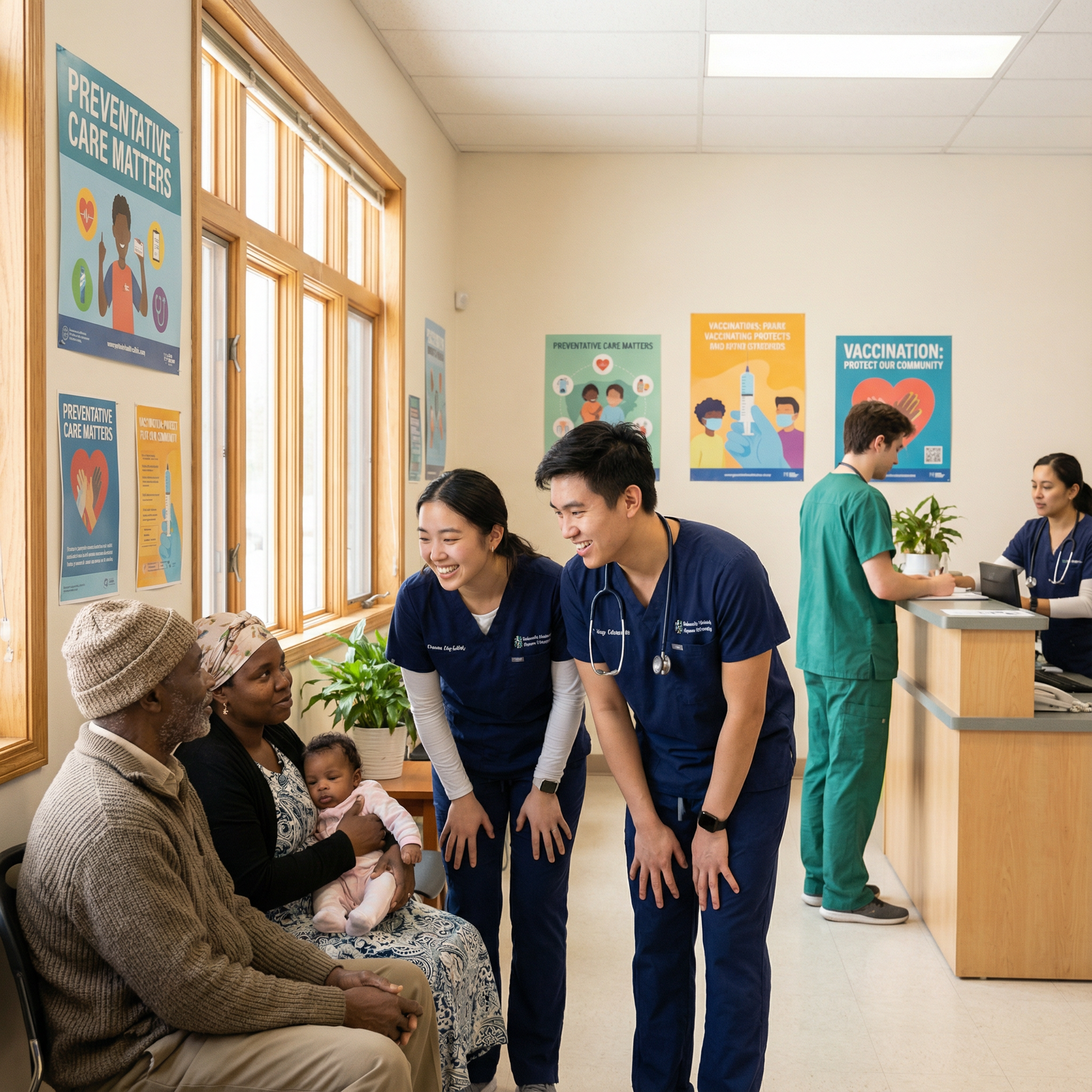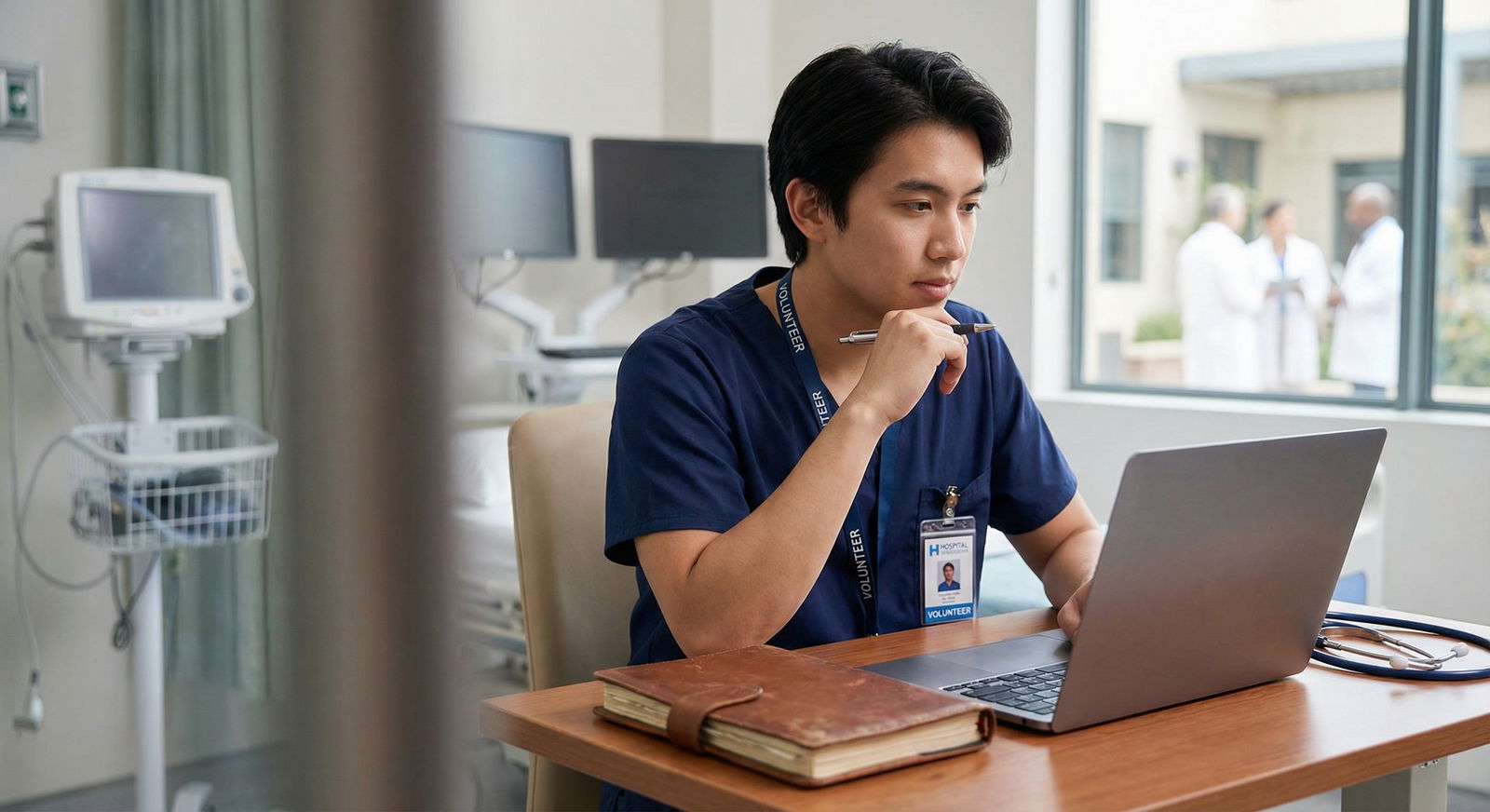
Earning Your Stripes: Clinical Volunteering That Truly Sets You Apart
Clinical volunteering is no longer a “nice-to-have” for aspiring physicians—it is one of the most powerful components of Medical School Preparation. In a field where many applicants share similar GPAs and MCAT scores, what often differentiates successful candidates is meaningful Healthcare Experience, particularly in patient-facing roles.
Thoughtful, strategic Clinical Volunteering helps you:
- Confirm that medicine is genuinely right for you
- Develop core skills in communication, empathy, and teamwork
- Gain realistic insight into patient care and healthcare systems
- Build relationships for strong letters of recommendation
- Craft compelling stories for personal statements and interviews
This guide expands on those foundations and offers concrete Volunteer Strategies to help you move beyond “checking a box” to creating Clinical Volunteering experiences that genuinely shape your path to medicine—and make your application stand out.
Understanding Clinical Volunteering in the Context of Medical School Preparation
Clinical volunteering is not just “helping in a hospital.” It is a structured way to step into the healthcare environment, contribute to patient care, and learn how health systems function—long before you wear a white coat.
What Counts as Clinical Volunteering?
Clinical volunteering involves unpaid work in a healthcare setting where you:
- Are exposed to real patients and healthcare teams
- Support patient care directly or indirectly
- Observe clinical workflows, communication, and decision-making
Common settings include:
- Hospitals (inpatient units, EDs, outpatient clinics)
- Community health centers and free clinics
- Skilled nursing facilities and rehabilitation centers
- Hospice and palliative care programs
- Mobile clinics, health fairs, and community screening events
Typical responsibilities might include:
- Patient-facing tasks
- Escorting patients to appointments or imaging
- Assisting with patient intake, vital signs (if allowed and trained)
- Offering companionship to isolated or long-term patients
- Translating or interpreting (if qualified and permitted)
- Indirect patient care and support
- Chart preparation or basic record-keeping
- Stocking supplies and preparing exam rooms
- Supporting health education sessions or discharge teaching
- Helping run community health initiatives (vaccination drives, screenings)
The key element isn’t how “impressive” the title sounds; it’s the extent to which you’re meaningfully involved in patient care and the learning you derive from it.
Why Clinical Volunteering Matters for Aspiring Physicians
Clinical Volunteering sits at the intersection of experience, reflection, and professional identity formation. For premeds and early medical students, it plays several crucial roles.
1. Demonstrates Authentic Commitment to Medicine
Admissions committees want evidence that you understand medicine beyond TV shows and secondhand stories. Consistent Clinical Volunteering signals that you:
- Know what it feels like to work with sick, scared, or vulnerable people
- Have seen the less glamorous aspects of healthcare (paperwork, long hours, difficult conversations)
- Still want to be part of this world
A few months of scattered shifts reads as “exploration.” A sustained commitment with growing responsibility reads as “dedication.”
2. Builds Core Clinical and Interpersonal Skills
You aren’t expected to diagnose or treat as a volunteer—but you are expected to develop skills that will make you a better physician later, such as:
- Active listening and clear communication with patients and staff
- Empathy, patience, and emotional regulation
- Professionalism: punctuality, reliability, confidentiality, and teamwork
- Comfort in clinical spaces—monitors beeping, alarms, codes, high stress
These translate directly into better performance during clinical rotations and, eventually, residency.
3. Opens Doors for Mentorship and Networking
Clinical Volunteering places you near:
- Physicians and advanced practice providers
- Nurses, social workers, therapists, and other allied health professionals
- Medical students and residents who recently navigated the same path
These individuals can:
- Offer candid advice on your Medical School Preparation
- Provide shadowing opportunities
- Write specific, detailed letters of recommendation that highlight your growth, work ethic, and patient care skills
Strong relationships built over time are worth far more than a long list of short-term experiences.
4. Deepens Your Understanding of Diverse Patient Populations
Modern medicine demands cultural humility and the ability to care for diverse communities. Volunteering is one of the most direct ways to:
- Encounter patients across age, language, cultural, and socioeconomic spectrums
- Witness how housing, food insecurity, transportation, and insurance status affect health (social determinants of health)
- Learn to communicate respectfully with people whose backgrounds differ from your own
These experiences become powerful narratives in your personal statement and interviews when you can articulate how they changed your view of patient care.

Strategy First: How to Choose and Shape Clinical Volunteering That Stands Out
Not all Healthcare Experience is equally valuable for your development or your application. The goal is not to collect random hours; it’s to design a coherent, impactful narrative.
1. Prioritize Quality Over Quantity
Admissions committees look for depth:
- Did you stay at one or two sites long enough to grow into new roles?
- Can you describe specific patients, moments, and lessons?
- Did your responsibilities or leadership evolve over time?
Compare these two profiles:
- Applicant A: 400 total hours across 7 different sites, each lasting 1–2 months. Most tasks were basic and superficial.
- Applicant B: 150 hours over 18 months in a single hospice program, eventually helping train new volunteers and joining family support meetings.
Applicant B often appears stronger because:
- Their experience is cohesive and easy to describe
- Letters of recommendation can be detailed and personal
- They clearly grew in responsibility and emotional maturity
Aim for:
- At least one long-term Clinical Volunteering role (6–12+ months if possible)
- A schedule that you can maintain alongside coursework (e.g., 3–4 hours weekly)
2. Align Opportunities with Your Interests—but Stay Open
You don’t need to “pick a specialty” as a premed, but you can explore areas that resonate with you:
- Interested in pediatrics? Children’s hospitals, school-based clinics, or camps for kids with chronic illness.
- Drawn to psychiatry or behavioral health? Mental health clinics, crisis hotlines, substance use programs.
- Curious about surgery or emergency medicine? ED volunteer positions, perioperative units, or trauma centers.
- Passionate about public and community health? Free clinics, immigrant health programs, public health departments.
However, don’t dismiss general experiences. A broad-based hospital volunteer role can still be extremely valuable if you:
- Seek out meaningful patient contact
- Ask questions of staff (respecting their time and boundaries)
- Reflect deeply on what you’re observing
3. Seek Leadership and Ownership as You Gain Experience
You may start with basic tasks, but over time look for ways to contribute at a higher level:
- Training or orienting new volunteers
- Coordinating schedules or managing small teams for specific projects
- Helping improve a workflow—for example, creating better patient education materials or revising volunteer procedures
- Leading outreach efforts for community screenings or vaccination drives
These leadership experiences demonstrate:
- Initiative and responsibility
- Ability to communicate and collaborate across disciplines
- Capacity to identify problems and work toward solutions—skills core to residency and beyond
4. Build a Habit of Structured Reflection
Reflection is where raw experience becomes insight, and insight becomes compelling narrative.
After each shift, consider jotting down:
- One patient interaction that stood out
- One challenge (ethical, emotional, or logistical) you faced
- One thing you learned about the healthcare system or patient care
- One way this experience reinforced or challenged your desire to pursue medicine
You can use a simple template:
- Situation: What happened?
- Your role: What did you do or observe?
- Impact: How did it affect the patient, team, or you?
- Insight: What did you learn about medicine, yourself, or patient care?
These notes will later:
- Provide rich material for personal statements and secondaries
- Help you answer “Tell me about a time…” questions in interviews
- Clarify for you whether medicine truly aligns with your values and strengths
Real-World Examples: How Clinical Volunteering Shapes Future Physicians
Concrete stories show how well-designed Clinical Volunteering experiences can transform both your understanding of medicine and your application.
Case Study 1: Maria’s Path Through Community Medicine
Maria, a first-generation college student, started Clinical Volunteering at a free community clinic serving uninsured and undocumented patients.
Over two years, she:
- Helped with patient intake and basic paperwork
- Assisted nurses with vitals after appropriate training
- Participated in evening health education workshops on diabetes and hypertension
Key turning points:
- She noticed patients missing follow-ups due to transportation and work schedules, prompting her to help pilot reminder calls and flexible appointment blocks.
- She began shadowing the clinic’s family physician, who discussed how immigration status, employment insecurity, and language barriers shaped care plans.
Impact on her Medical School Preparation:
- Her personal statement centered on one patient who delayed seeking care due to fear of deportation, highlighting Maria’s growing awareness of trust and access in healthcare.
- The clinic physician wrote a powerful letter describing Maria’s reliability, cultural humility, and initiative.
- Maria entered medical school with a strong interest in primary care and health equity, already familiar with community-based Patient Care.
Case Study 2: James and Longitudinal Work in Child Health
James knew he enjoyed working with kids but wasn’t sure how that would fit into a medical career. He found a volunteer role in a program that partnered with local schools to provide:
- Basic health screenings (vision, BMI, dental checks)
- Interactive workshops on nutrition, exercise, and mental wellness
As his commitment deepened, James:
- Designed age-appropriate activities using games and stories to teach about healthy habits
- Collaborated with school counselors to identify students who needed follow-up referrals
- Helped develop bilingual materials for families with limited English proficiency
Through these experiences, he:
- Practiced explaining medical concepts in simple, accessible language
- Witnessed firsthand how family dynamics, stigma, and resource limitations affected children’s health
- Became a go-to leader in the program, training newer volunteers and coordinating school visits
In applications and interviews, James was able to:
- Describe specific families and children who influenced his interest in pediatrics and adolescent medicine
- Demonstrate leadership, collaboration with non-physician professionals, and commitment to preventive care
- Show that his Healthcare Experience was not just passive observation but active contribution
Finding, Securing, and Succeeding in Clinical Volunteering Roles
Turning intention into action requires knowing where to look and how to present yourself professionally.
Where to Find Clinical Volunteering Opportunities
Start with these common avenues:
Hospital Volunteer Departments
- Many hospitals have structured programs with defined roles, training, and schedules.
- Check hospital websites, usually under “Volunteer Services” or “Serving Our Community.”
Community Health Centers and Free Clinics
- Offer high-yield exposure to underserved populations and primary care.
- Some require longer commitments but provide more hands-on experience.
Nonprofit Organizations
- Examples: organizations focused on HIV, maternal health, cancer support, refugee health, or elder care.
- Roles may include both clinical support and health education.
University or College Resources
- Premed advising offices may maintain lists of local programs.
- Student-run clinics and service organizations often welcome committed new volunteers.
Public Health Departments and Community Programs
- Involvement in vaccination campaigns, health fairs, screenings, or education.
- Strengthens your understanding of population health and preventive strategies.
If you’re struggling to find opportunities:
- Call local clinics directly and ask if they accept volunteers
- Reach out to faculty or mentors for connections
- Consider smaller community hospitals rather than only large academic centers
How to Apply Effectively and Professionally
Treat volunteer applications as you would a job application:
- Prepare a polished resume emphasizing:
- Prior service experience
- Language skills
- Any certifications (CPR, EMT, CNA)
- Write a short, thoughtful statement of interest describing:
- Why you want to volunteer in that specific setting
- How your background prepares you to contribute
- Your availability and commitment
Then:
- Follow instructions carefully (deadlines, forms, required immunizations, background checks).
- Respond promptly to emails or calls—it signals reliability.
- Be realistic about your schedule; under-committing and over-delivering is far better than the reverse.
Professionalism and Growth Once You Start
Once you’re in a Clinical Volunteering role, the way you conduct yourself will determine what you gain from it:
- Be on time, every time. If you must miss a shift, give as much notice as possible.
- Dress appropriately and adhere to all confidentiality and infection-control policies.
- Learn names—of nurses, custodial staff, patients when appropriate; it shows respect and builds rapport.
- Ask thoughtful questions during appropriate moments, but never when staff are managing crises.
- Seek feedback from supervisors: “Is there anything I could be doing more effectively?”
Over time, ask about:
- Additional trainings you can complete
- Tasks you may be able to take on with supervision
- Ways to become involved in quality improvement or patient education initiatives

Turning Experience into Evidence: Using Volunteering in Applications and Interviews
Having strong Clinical Volunteering is only half the battle; you also need to communicate it effectively in personal statements, secondaries, and interviews.
Writing About Clinical Volunteering in Your Application
When describing your experiences:
- Avoid generic claims like “I learned to be empathetic.”
- Focus on specific stories that illustrate:
- A challenge you faced
- How you responded or grew
- What you learned about patient care or your future role as a physician
For example, instead of:
“I gained a deep appreciation for the importance of communication.”
You might say:
“While volunteering on the oncology floor, I met a patient who repeatedly missed physical therapy sessions. After spending time listening to her fears about pain and losing independence, I relayed her concerns to the nurse. Together, we worked with the PT team to adjust the plan and improve her comfort. That experience showed me how small moments of listening can change the course of a patient’s recovery.”
This shows, rather than tells, the impact of your Healthcare Experience.
Preparing to Discuss Clinical Volunteering in Interviews
Expect questions such as:
- “Tell me about a meaningful patient interaction.”
- “What did you find most challenging about your Clinical Volunteering?”
- “How did your volunteering confirm your decision to pursue medicine?”
Use a simple structure when answering:
- Context: Briefly set the scene.
- Action: Describe what you did, focusing on your role.
- Reflection: End with what you learned and how it will influence you as a future physician.
Always respect patient privacy: change or omit identifying details and never share information that could compromise confidentiality.
Clinical Volunteering FAQ: Common Questions from Premeds and Early Medical Students
Q1: How many hours of Clinical Volunteering do I need for medical school?
There is no universal “magic number,” but admissions committees generally prefer consistent involvement over time rather than short bursts. Many competitive applicants accumulate 100–300+ hours of Clinical Volunteering spread over at least 6–12 months. Focus on:
- Sustained commitment (e.g., weekly or biweekly shifts)
- Roles where you grow in responsibility
- Experiences that allow for meaningful patient interaction and reflection
Q2: What if I can’t find hospital-based Clinical Volunteering—will other settings still count?
Yes. Medical schools value a range of healthcare settings, not just hospitals. Free clinics, community health centers, hospice programs, nursing homes, rehabilitation centers, and community-based health initiatives can all provide excellent Clinical Volunteering experiences. What matters is:
- Exposure to patients and healthcare teams
- Clear contribution to patient care or health education
- Your ability to articulate what you learned
Q3: Can virtual or remote healthcare roles be considered clinical experience?
Virtual roles can complement but usually do not fully replace in-person Clinical Volunteering. Remote opportunities such as telehealth support, virtual patient navigation, or health coaching can be valuable if you are:
- Interacting directly with patients or families
- Supporting real aspects of patient care
- Supervised by healthcare professionals
However, aim to include at least some in-person Healthcare Experience to demonstrate comfort in physical clinical environments.
Q4: How do I decide between research and Clinical Volunteering if my time is limited?
Both can strengthen your application, but they serve different purposes:
- Clinical Volunteering: Shows your commitment to patient care, your understanding of the realities of medicine, and your interpersonal skills.
- Research: Demonstrates curiosity, critical thinking, and comfort with scientific inquiry.
Ideally, you will do some of both. If you must choose:
- Prioritize enough Clinical Volunteering to clearly show you understand what being a physician involves.
- Add research if you have time and genuine interest, especially if you’re considering academic or research-intensive programs.
Q5: How can I turn a seemingly “simple” volunteer role into a standout experience?
Even if your tasks feel basic—stocking supplies, escorting patients, answering phones—you can elevate the experience by:
- Building rapport with patients through respectful, compassionate communication
- Observing how the healthcare team interacts and reflecting on what works well
- Asking supervisors how you can be more helpful and gradually taking on more responsibility
- Identifying small problems (e.g., confusing signage, long wait times) and proposing solutions within your role’s scope
Ultimately, it is your commitment, growth, and insight—not the “fanciness” of the role—that sets you apart.
Well-designed Clinical Volunteering is one of the most powerful tools in your Medical School Preparation toolkit. By choosing roles thoughtfully, committing over time, seeking leadership and reflection, and learning to articulate your experiences, you move beyond “checking a box” to truly earning your stripes as a future physician.






















